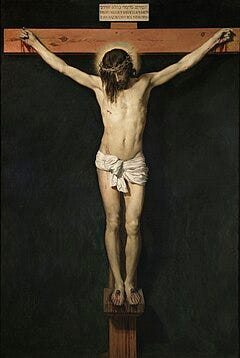Reflection is taken from the readings for the Feast of St. Francis de Sales, Bishop and Doctor of the Church
The Gospel for today is taken from St. John’s Last Supper discourse. Unlike the Synoptics, St. John does not record the Institution of the Eucharist. Instead, he records the final teachings that Our Lord gives to His Apostles. When read together, the Synoptics and St. John give a more complete narrative of what happened during the Last Supper.
For today, we have the part of the discourse where Our Lord exhorts His Apostles to love. This is not just any love; it is a love that imitates Jesus Christ:
“This is my commandment: love one another as I love you. No one has greater love than this, to lay down one's life for one's friends.” John 15:12-13
Christ lays out exactly what love looks like. It is not simply a feeling. It is a movement of the will for the good of the other to the point of sacrifice. Truly, the Last Supper and its completion in the cross are the perfect example of this love. It is a self-giving love. Christ’s command is to love one another as He has loved. How has He loved?
To the point of death!
Love is always an action. It is a movement of the will toward the good of the other, in particular, toward the other’s greatest good. This is why Christ tells us that there is no greater love than to lay our lives down. This paints the picture of a self-sacrificial act where we die in place of another. How else can we characterize the actions of Our Blessed Lord in the following twelve or so hours after He said this? He not only exhorts His followers to lay their lives down, but He embodies that command by going willingly to the cross.
Again, I want to repeat the aspect of a movement of the will. Christ tells us a bit earlier in St. John’s Gospel:
“For this reason, the Father loves me, because I lay down my life, that I may take it again. No one takes it from me, but I lay it down of my own accord.” John 10:17-18.
Our Lord repeats over and over again in the Gospels that He willingly lays His life down. No one takes it from Him. He is a willing sacrifice. This is a movement of His great love for mankind.
We are called to imitate this love. We are called to sacrifice ourselves for the good of our neighbor. Many of us will not be called to lay our physical life down. But we lay our lives down in a movement of love when we serve those around us, our family, our friends, our co-workers, the poor on the side of the road, etc. We may also be called to sacrifice something greater: friendships, jobs, familial relationships, etc. for the love of Christ. Each of these is a way we lay our lives down.
Love one another as I have loved you.
This is the command we are given today and every day. Let us ask God for the grace to keep this commandment.



Hey Brother, thanks for your reflections. Spending some time with the word this morning, I’ve recently been overcome by how the Lord has willingly gone into every single dark place to bring the light of his Father‘s love. If you’ve been abused, Christ is there. If you’ve been lied to, Christ is there. If you’ve been betrayed, Christ is there. If you’ve sinned and done horrible things Christ is there - absorbing it into the depths of his mercy, giving himself in return. There is literally no place we can go and not encounter Christ’s presence. And like you say, he willingly placed Himself there. He still places himself there. We don’t find him in these places because Pilate dragged him there, or the Sanhedrin captured him. We find Him there because he wanted to go there. He still wants to be there. And in these places, his resurrection exists also. For all time.